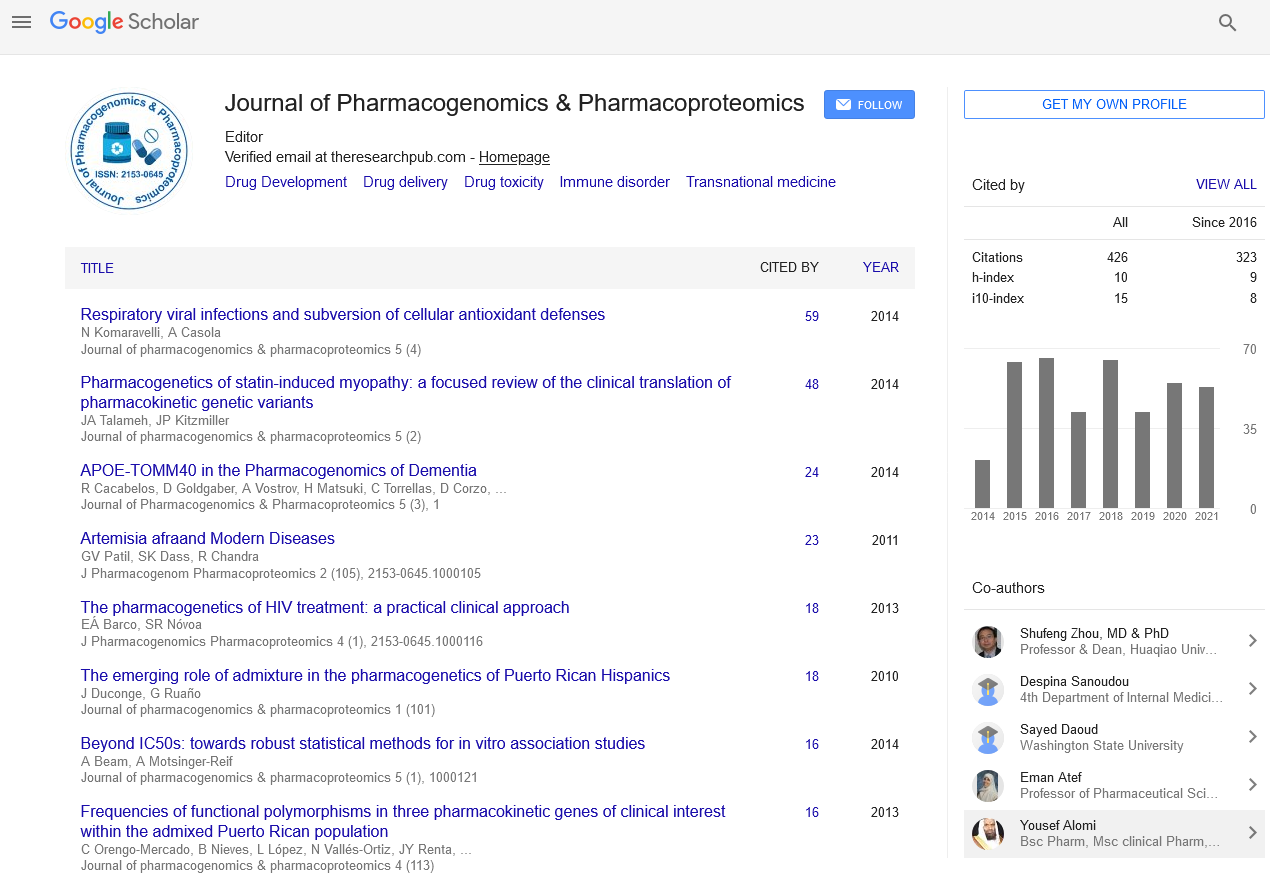Indexed In
- Open J Gate
- Genamics JournalSeek
- Academic Keys
- JournalTOCs
- ResearchBible
- Electronic Journals Library
- RefSeek
- Hamdard University
- EBSCO A-Z
- OCLC- WorldCat
- Proquest Summons
- SWB online catalog
- Virtual Library of Biology (vifabio)
- Publons
- MIAR
- Euro Pub
- Google Scholar
Useful Links
Share This Page
Journal Flyer

Open Access Journals
- Agri and Aquaculture
- Biochemistry
- Bioinformatics & Systems Biology
- Business & Management
- Chemistry
- Clinical Sciences
- Engineering
- Food & Nutrition
- General Science
- Genetics & Molecular Biology
- Immunology & Microbiology
- Medical Sciences
- Neuroscience & Psychology
- Nursing & Health Care
- Pharmaceutical Sciences
Risk polymorphisms associated with lipid metabolism and vascular risk in the Spanish population
5th International Conference on Predictive, Preventive and Personalized Medicine & Molecular Diagnostics
December 01-02, 2016 Valencia, Spain
Oscar Teijido, Juan Carlos Carril and Ramon Cacabelos
EuroEspes Biomedical Research Center, Spain
Camilo José Cela University, Spain
Posters & Accepted Abstracts: J Pharmacogenomics Pharmacoproteomics
Abstract:
Cerebrovascular disorders and stroke are the third leading cause of death in the US and in Europe with around 200 cases per 100000 inhabitants per year and almost six million victims every year, according to the WHO. Furthermore, Metabolic Syndrome (MS) affects 20-34% of the population, primarily in developed countries. MS is characterized by low high-density lipoprotein (HDL) levels, high blood serum triglycerides, high blood pressure, abdominal obesity and elevated fasting plasma glucose, which confers a higher risk for thrombosis and diabetes than average population. Population studies evaluate the genetic risk, i.e., the probability of an individual carrying a specific disease associated polymorphism. Identification of risk polymorphisms is essential for an accurate diagnosis or prognosis of a number of pathologies. The aim of this study was to characterize the influence of risk polymorphisms associated with lipid metabolism, hypertension and thrombosis in a large population of Spanish individuals affected by a variety of brain and vascular disorders as well as metabolic syndrome. We performed a cross sectional study in 4415 individuals from a widespread regional distribution in Spain (48.15% males and 51.85% females) with cerebrovascular, metabolic and mental disorders. We evaluated polymorphisms in a number of genes involved in obesity, cerebrovascular and cardiovascular risk in our population and compared it with representative Spanish and European populations. We identified polymorphisms in ACE, AGT (235), IL6 (573) as representative risk factors for vascular and lipid metabolism related disorders in our population in comparison to reference data of Spanish and European individuals. Predominance of APOE-ε4 and reduced APOE-ε2 allele distribution compared to other representative Spanish and South European populations might be associated with Alzheimer�??s disease or dementia related disorders rather than vascular or lipid metabolism imbalance in our population.
Biography :
Oscar Teijido Hermida is the Head of the Medical Epigenetics Department at EuroEspes Biomedical Research Center, Institute of Medical Science and Genomic Medicine, Corunna, Spain. He has received his PhD from the University of Barcelona, Spain in 2007 with the thesis entitled Biochemical characterization and location of the protein MLC1, involved in the megalencephalic leukoencephalopathy with subcortical cysts. During his scientific career in University of A Corunna, Spain, University of Barcelona, Spain, New York University, USA and The National Institutes of Health, USA, he has achieved more than 20 scientific publications in the molecular genetics, biochemistry and physiology fields and presented his work in more than 25 international conferences and invited presentations.
Email: epigenetica@euroespes.com


